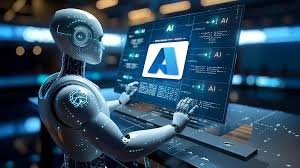Microsoft Azure has long been at the forefront of cloud computing, and its integration of Artificial Intelligence (AI) and Machine Learning (ML) capabilities has taken cloud services to the next level. Over the next decade, Azure is expected to continue driving innovations that will fundamentally reshape industries, workflows, and human experiences. In this article, we will explore the Top 5 Azure AI and Machine Learning Innovations that are poised to shape the next decade.
Azure OpenAI Service: Democratizing Powerful Generative AI Models Overview
Microsoft’s partnership with OpenAI has led to the creation of the Azure OpenAI Service which allows businesses and developers to integrate cutting-edge generative AI models like GPT (Generative Pretrained Transformer) and DALL·E into their applications. These models are designed to generate human-like text and images, answer complex queries, summarize information, and even generate creative content.
Impact on the Future
Over the next decade, the Azure OpenAI Service is expected to revolutionize content creation, customer service, and data analytics. For instance, the ability to generate high-quality text or code on demand could drastically reduce the time and resources required for software development. Similarly, its integration into customer service chatbots will make interactions more personalized and responsive. The platform’s ease of use—combined with its scalability and integration capabilities with other Azure services—will lower the barriers for businesses to access advanced AI, enabling innovation in industries like healthcare, education, media, and entertainment.
Key Innovations
Contextual Understanding: GPT-based models will evolve to understand deeper contexts, enabling more relevant and coherent interactions.
AI-Powered Content Creation: Media companies can generate high-quality written, audio, and visual content faster and cheaper.
Personalized Customer Support: Chatbots will handle more sophisticated queries, improving customer experience.
Azure Machine Learning (Azure ML) and MLOps: Streamlining ML Workflows
Overview
Azure Machine Learning (Azure ML) provides a comprehensive platform for developing, training, and deploying machine learning models at scale. It supports various ML frameworks, including TensorFlow, Porch, and Scikit-Learn, enabling data scientists and developers to build custom models suited to their specific needs. With MLOps (Machine Learning Operations), Azure is helping organizations streamline their ML workflows, ensuring collaboration, reproducibility, and consistency across teams.
Impact on the Future
In the next decade, Azure ML’s ability to automate the ML lifecycle—from data preparation and model training to deployment and monitoring—will significantly enhance productivity and collaboration in AI projects. The integration of MLOps will further bridge the gap between data scientists, IT operations, and business units, ensuring that AI models are continuously improved, tested, and deployed in a secure, scalable manner. This will allow organizations to extract more value from their data, reduce time-to-market for AI applications, and scale AI solutions globally.
Key Innovations
Automated Machine Learning (AutoML): Azure ML's AutoML capabilities will allow non-experts to build models efficiently, broadening AI adoption.
Model Interpretability: With tools for model transparency, organizations can gain trust in AI solutions by understanding decision-making processes.
End-to-End MLOps: Full lifecycle automation of ML from experimentation to deployment and monitoring, ensuring faster innovation and better performance.
Azure Cognitive Services: Advanced AI Capabilities for Every Industry
Azure Cognitive Services offers a wide range of pre-built APIs that bring AI capabilities like vision, speech, language, and decision-making to developers, eliminating the need for deep expertise in AI. Services such as Computer Vision, Speech Recognition, Language Understanding (LUIS), and Azure Form Recognizer have made it easier for organizations to embed AI into their applications without having to develop custom models from scratch.
Impact on the Future
The next decade will see Azure Cognitive Services evolve into even more powerful tools that can understand, interpret, and respond to human behaviors' with remarkable accuracy. For example, the Speech-to-Text and Text-to-Speech services will improve to the point where voice assistants and AI-driven communication tools can handle complex conversations in multiple languages with natural intonation. Vision-based models will also evolve to enable machines to "see" and interpret not just images, but also real-time environmental contexts, enabling breakthrough applications in healthcare (e.g., medical imaging), retail (e.g., inventory management via object detection), and autonomous vehicles.
Key Innovations
Emotion AI: AI models that can detect emotional cues from speech, facial expressions, and text, enhancing customer service, healthcare, and personalized experiences.
Real-time Translation and Transcription: Azure Cognitive Services will enable seamless communication across language barriers with near-instant translation.
Advanced Visual Recognition: Object recognition capabilities will improve for applications like defect detection in manufacturing or real-time analysis of medical images.
Azure AI in Edge Computing: Bringing Intelligence Closer to the Data Impact on the Future
Azure’s investments in AI at the edge will likely reshape industries that require immediate decision-making. For example, in manufacturing, predictive maintenance can be achieved by analysing sensor data locally on the factory floor. In healthcare, medical devices can use AI to analyse patient data in real time, providing faster diagnoses without needing constant cloud connectivity. The decentralized nature of edge computing also reduces latency and bandwidth costs, enabling highly responsive systems in remote or resource-constrained environments.
Key Innovations
Local AI Processing: Edge devices can make real-time decisions based on AI models without needing to constantly communicate with the cloud.
Reduced Latency and Bandwidth Costs: By processing data locally, organizations can reduce operational costs and improve performance.
Autonomous Systems: In autonomous vehicles, drones, and robotics, Azure AI at the edge will be critical for real-time object detection, decision-making, and navigation.
Azure AI for Healthcare: Transforming Medicine and Patient Care
Impact on the Future
In the next decade, AI-powered healthcare solutions on Azure will enable personalized medicine, where treatments and medications are tailored specifically to individuals based on their genetic data, medical history, and lifestyle. AI will be used extensively for early disease detection, drug development, and even robotic surgeries. By combining vast amounts of medical data, Azure will play a critical role in improving patient outcomes, reducing costs, and driving innovations in health tech.
Key Innovations
Personalized Medicine: AI models that analyze patient-specific data will enable highly personalized treatments, reducing side effects and improving outcomes.
Predictive Diagnostics: Using AI to analyze patient data for early signs of diseases like cancer or heart conditions, increasing survival rates.
AI in Drug Discovery: Machine learning models will expedite the discovery of new treatments and vaccines, revolutionizing pharmaceutical development.
Conclusion: Azure’s Future Role in AI and ML Innovation
The innovations driven by Azure AI and ML will profoundly transform industries and everyday life over the next decade. From democratizing access to cutting-edge generative models with Azure OpenAI to advancing healthcare with personalized, AI-powered solutions, Microsoft Azure is poised to be a central player in shaping the future of AI. Through continuous improvement of tools like Azure Machine Learning, Cognitive Services, Edge AI, and healthcare solutions, Microsoft is empowering organizations to harness the power of data and intelligence like never before, unlocking new possibilities for innovation and growth.As these advancements unfold, Azure’s integration of AI into all facets of business and society will redefine how we interact with technology, make decisions, and address some of the world's most pressing challenges.











